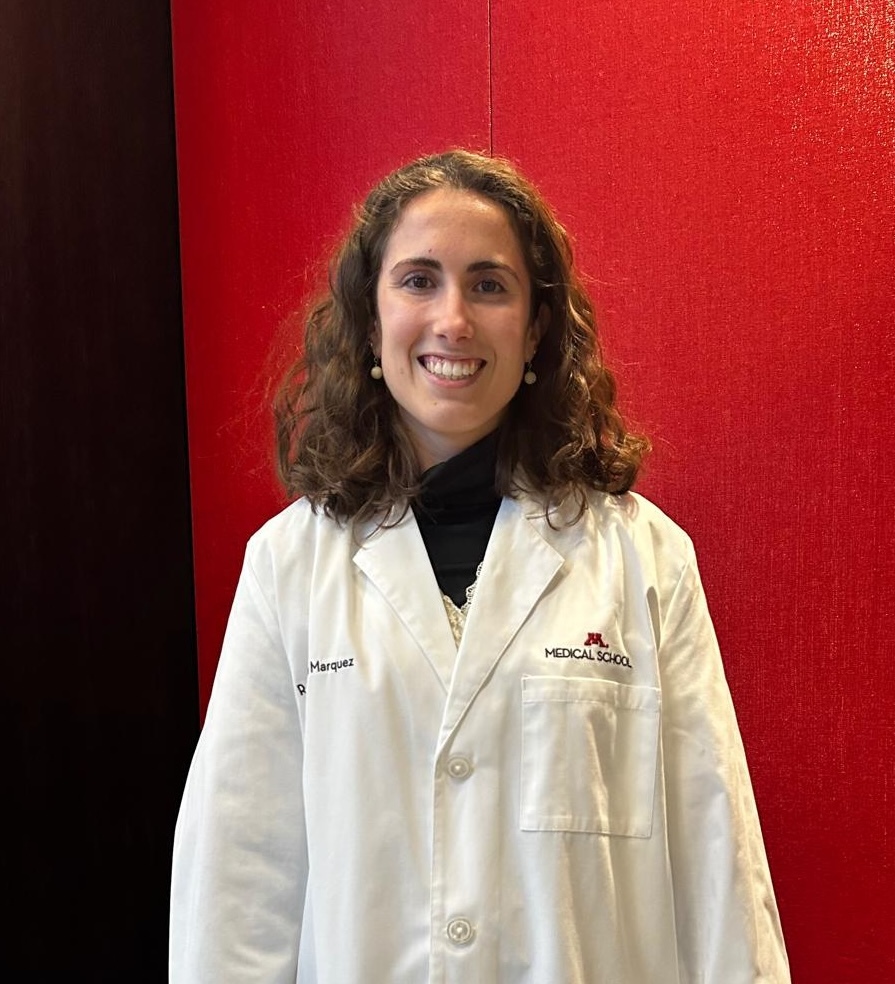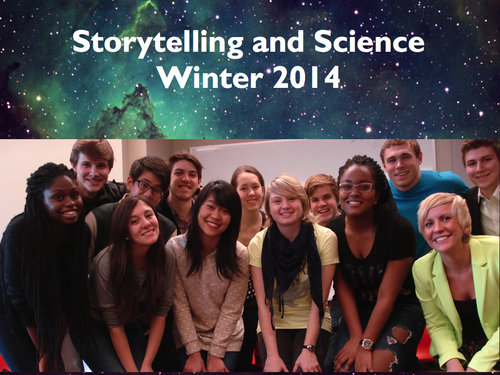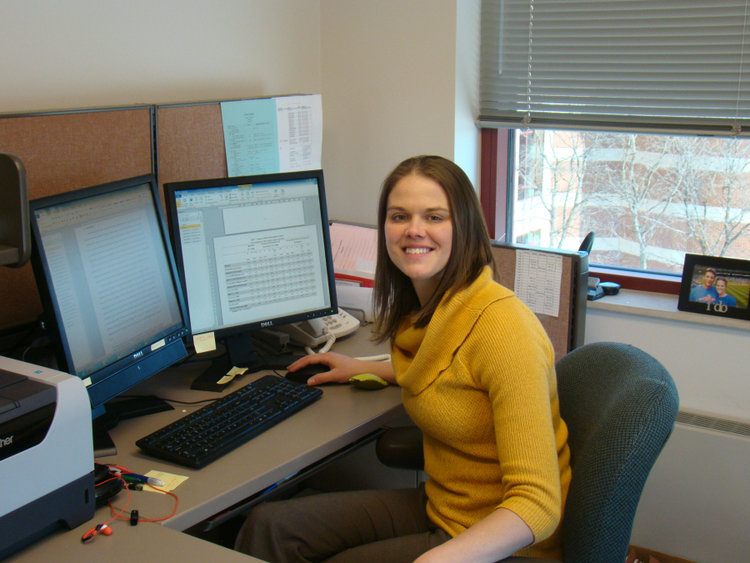Rocio Amaro Marquez
2022 Fellowship Recipient
 Pursuing a Ph.D. is challenging yet highly rewarding. My work at the Blazar lab in the University of Minnesota Twin Cities focuses on chronic graft-versus-host disease (cGVHD), a disease that can arise post allogeneic hematopoietic stem cell transplantation (HSCT). For patients suffering hematologic malignancies such as acute myeloid leukemia or multiple myeloma, HSCT remains the only curative option. However, cGVHD develops in up to 50% of patients and rapidly becomes a serious complication of allo-transplantation. Responses to current therapies remain uncommon. This debilitating disease is characterized by immune dysregulation, autoimmunity, and fibrosis. To study cGVHD-induced lung fibrosis, I am working with a murine model of bronchiolitis obliterans, a respiratory complication, in cGVHD. Specifically, I am studying the role of monocytes and macrophages in disease and how recruited macrophages contribute to tissue injury or guide anti-inflammatory non-classical macrophages to induce fibrosis via TGFβ, a regulator of alloimmunity. Macrophage activation can be inhibited by TGFβ as it produces a chemotactic signal that promotes the recruitment of monocytes and neutrophils to sites of tissue injury. The main goal of this project is to attenuate TGFβ production by profibrotic macrophages. Through my work, I have observed improved lung function in mice at day 49 post transplantation upon treatment with MANP/TGFβ-siRNA. Mannosylated Albumin Nanoparticles (MANPs) loaded with TGFβ silencing RNA target the mannose receptor (CD206) on pathogenic macrophages aiming to reduce lung fibrosis by reducing TGFβ production. A lot of time and dedication has gone into this work; however, it has been a gratifying experience.
Besides research, one of my favorite things during graduate school is traveling to meet collaborators and experts in this field and to share my research with the community. I have enjoyed attending science conferences of all kinds; SACNAS (Society for the Advancement of Chicanos/Hispanics and Native Americans in Science), AAI (American Association of Immunologists), ACS (American Chemical Society) and UMN-CFI (University of Minnesota Center for Immunology). Sharing my research and knowledge with various communities is one of my newly-found passions. I enjoy communicating science with scientists and non-scientists and learning to effectively communicate scientific findings to various audiences has been a wonderful journey. In addition, after attending the CFI conference for two years, I decided to become one of the student organizers and have done it twice since. Taking on this leadership role has been one of the most amazing experiences in my Ph.D. career as I get to learn science and connect with students and faculty of all scientific backgrounds.
Being a McElroy Fellow has allowed me to expand my career in ways that would be unimaginable. It has been a pleasure and honor to be supported by the kindness of R.J. McElroy Trust in my graduate studies. This opportunity has allowed me to share my work nationwide, to grow as a scientist and communicator, and to build my network. I have been able to create a community around me that will surely remain for the rest of my scientific career. Now, I am looking forward to finishing my projects at the Blazar Lab and, after my Ph.D., I am interested in becoming a science project manager in the field of immunotherapies for cancer treatment.
Pursuing a Ph.D. is challenging yet highly rewarding. My work at the Blazar lab in the University of Minnesota Twin Cities focuses on chronic graft-versus-host disease (cGVHD), a disease that can arise post allogeneic hematopoietic stem cell transplantation (HSCT). For patients suffering hematologic malignancies such as acute myeloid leukemia or multiple myeloma, HSCT remains the only curative option. However, cGVHD develops in up to 50% of patients and rapidly becomes a serious complication of allo-transplantation. Responses to current therapies remain uncommon. This debilitating disease is characterized by immune dysregulation, autoimmunity, and fibrosis. To study cGVHD-induced lung fibrosis, I am working with a murine model of bronchiolitis obliterans, a respiratory complication, in cGVHD. Specifically, I am studying the role of monocytes and macrophages in disease and how recruited macrophages contribute to tissue injury or guide anti-inflammatory non-classical macrophages to induce fibrosis via TGFβ, a regulator of alloimmunity. Macrophage activation can be inhibited by TGFβ as it produces a chemotactic signal that promotes the recruitment of monocytes and neutrophils to sites of tissue injury. The main goal of this project is to attenuate TGFβ production by profibrotic macrophages. Through my work, I have observed improved lung function in mice at day 49 post transplantation upon treatment with MANP/TGFβ-siRNA. Mannosylated Albumin Nanoparticles (MANPs) loaded with TGFβ silencing RNA target the mannose receptor (CD206) on pathogenic macrophages aiming to reduce lung fibrosis by reducing TGFβ production. A lot of time and dedication has gone into this work; however, it has been a gratifying experience.
Besides research, one of my favorite things during graduate school is traveling to meet collaborators and experts in this field and to share my research with the community. I have enjoyed attending science conferences of all kinds; SACNAS (Society for the Advancement of Chicanos/Hispanics and Native Americans in Science), AAI (American Association of Immunologists), ACS (American Chemical Society) and UMN-CFI (University of Minnesota Center for Immunology). Sharing my research and knowledge with various communities is one of my newly-found passions. I enjoy communicating science with scientists and non-scientists and learning to effectively communicate scientific findings to various audiences has been a wonderful journey. In addition, after attending the CFI conference for two years, I decided to become one of the student organizers and have done it twice since. Taking on this leadership role has been one of the most amazing experiences in my Ph.D. career as I get to learn science and connect with students and faculty of all scientific backgrounds.
Being a McElroy Fellow has allowed me to expand my career in ways that would be unimaginable. It has been a pleasure and honor to be supported by the kindness of R.J. McElroy Trust in my graduate studies. This opportunity has allowed me to share my work nationwide, to grow as a scientist and communicator, and to build my network. I have been able to create a community around me that will surely remain for the rest of my scientific career. Now, I am looking forward to finishing my projects at the Blazar Lab and, after my Ph.D., I am interested in becoming a science project manager in the field of immunotherapies for cancer treatment.
Audrey Miller
2020 Fellowship Recipient
Pursuing a Ph.D. is a highly rewarding enterprise, and I am so grateful to have been supported by the R.J. McElroy Fellowship for the past three years as I undertake my own graduate school journey. As I write this, I am a third-year Ph.D. candidate in Earth and Planetary Science at the University of California, Davis. I live on the "planetary" side of our department, studying early Solar System formation through cosmochemistry under my PI, Dr. Qing-zhu Yin.
I study meteorites to determine how planets, asteroids, and cometary bodies formed and evolved over the last ~4.6 billion years (with an emphasis on the earliest years of our ancient Solar System, when the most interesting processes were occurring). I work specifically with chromium isotope anomalies in meteorites to uncover those meteorites' genetic reservoirs in the protoplanetary disk (i.e., what parent body did a meteorite sample originate from?). Uncovering the provenance of a meteorite sample can tell us about the dynamical mixing that occurred between the inner and outer reservoirs of the Solar System after these parent bodies accreted long ago. This research takes place in a state-of-the-art 10-100 class cleanroom to ensure that our meteorites are not contaminated by terrestrial metals - a very important consideration when working with precious and sensitive extraterrestrial samples!
In addition to this "out-of-this-world" research, another highly rewarding aspect of graduate school has been teaching and passing on scientific knowledge. Some of my favorite graduate school memories thus far come from the privilege of TA'ing courses such as physical geology, astrobiology, geochemistry, and radiogenic isotope geology; writing letters of recommendation for students with whom I developed a positive rapport; and even teaching my very own summer course in oceanography in 2021. Spending time with curious, engaged students is a highly valuable and academically enriching endeavor, and is something I hope to continue long after graduate school. I truly believe I have learned as much from my students as they have learned from their course content.
In summary, it has been a great honor to be a McElroy fellow. I have developed considerably as a scientist over the last three years, thanks in a very large part to the generosity of the R.J. McElroy Trust giving me the financial space to pursue graduate research. With such a solid foundation from these first couple years, I am excited to see where the next few years take my extraterrestrial research endeavors and development as a science educator.
Dallas Wulf
2012 Fellowship Recipient.
“My research group at the University of Wisconsin-Madison studies X-rays produced in the local galaxy as a means to understanding the environment of interstellar space. Since these X-rays can’t penetrate very far through air, we use sounding rockets to get our X-ray detector above the atmosphere.
The picture is from our most recent rocket flight, at White Sands Missile Range (New Mexico) in November of 2013. I spent the preceding month working on-site with people from NASA’s sounding rocket program to prepare for the launch. The seven of us pictured were in charge of the on-board X-ray detector.”
Annie Bruns
2009 Fellowship Recipient

I will be graduating with my PhD in Molecular Biology from Northwestern University this July. My research focuses on the mammalian cellular response to RNA virus infection. RNA viruses range from the pesky common cold, to influenza, to life-threatening HIV. A family of proteins expressed in nearly all cells of our body have the ability to detect RNA viruses, serving as the first line of defense against infection. Throughout my thesis research I characterized the mechanism by which two of these proteins work together to detect RNA viruses, ultimately warning the cell and neighboring cells that an invader has been spotted. This allows the infected cell and neighbors to establish a powerful antiviral state, ultimately preventing the spread of the infection.
In addition to my research, I have had the opportunity to both teach and communicate science during my time at Northwestern. These were invaluable experiences as I aspire to become an ambassador of science to the public, generating admiration and awe of science, nature, and the scientific method. I participated in various science outreach programs for underrepresented populations, including teaching biology in ESL high school classrooms, and mentoring middle school students during a summer science camp. I was also a contributing writer for Northwestern’s Helix web magazine, and created two episodes of my own original science podcast “Science and Awe.”
This past year I also had the opportunity to independently design and teach a new freshman seminar at Northwestern called Storytelling and Science. In this course, students learned the elements of powerful storytelling and applied them to contemporary scientific discourse. The experience of teaching this course renewed my passion for science communication. I will be attending a highly competitive science communication conference at Harvard this June, and plan to continue with a career in science communication after completing my PhD.
I am very grateful not only for the critical financial support provided by the McElroy Trust, but also for their belief in me. That interview was the first time I shared my dream of becoming a “science ambassador” with essentially complete strangers, and their support helped me believe that what felt like only an idea in my mind could become an achievable and meaningful career. ”
Alicia Rosburg
2006 Fellowship Recipient

I am currently an assistant professor of economics at my alma mater, the University of Northern Iowa (UNI). My journey back “home” was both challenging and fulfilling. The financial assistance provided by the McElroy Fellowship was instrumental and allowed me to explore opportunities during graduate school that otherwise would not have been possible.
During my graduate studies at Iowa State University, I had the benefit of working on policy-relevant topics with top researchers in my fields (environmental and agricultural economics). My dissertation focused on the economics of cellulosic biofuel, or fuel produced from grass or crop residues (“biomass”). I have continued my research in this area and currently have research projects on the potential locations and sizes of biofuel production facilities, the economics of different biomass supply methods, and strategies to minimize biomass supply risk. In addition, I have begun to explore other areas in economics such as housing market determinants and the relationship between drug use and labor market outcomes.
Although I truly enjoy my research and the opportunity to be a life-time learner, teaching has always been a passion. My position at UNI has allowed me to cultivate this passion. I currently teach Principles of Microeconomics, Decision Techniques, and Environmental Economics. While I enjoy all my classes, Environmental Economics is special in that it allows me to incorporate my research into the classroom and to work on research projects with students. I look forward to many more years of sharing my passion for economics with UNI students.
Alice Obrecht
2004 Fellowship Recipient.
“I have used my PhD to pursue a career in the aid sector, in a research capacity. I am currently working as Senior Research Analyst at the Humanitarian Futures Programme, at King’s College, London. My role here is to work with organisations with humanitarian roles and responsibilities to improve their capacity to deal with new and evolving crisis drivers. In my primary function I oversee the FOREWARN Initiative, a 3.5 year project which seeks to build institutional capacities for disaster risk reduction across West Africa. As part of this initiative, I recently travelled to Akosombo Dam in Ghana to carry out research on cross-border water governance in the Volta River Basin (see photo).
My approach to issues of aid effectiveness, institutional accountability and poverty reduction is research-focused and analytical. I would not have this perspective or these skills if it were not for my PhD, and my PhD would not have been economically viable for me without the generous support given to me by the McElroy Trust.”





